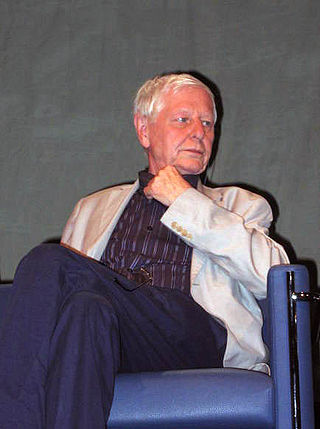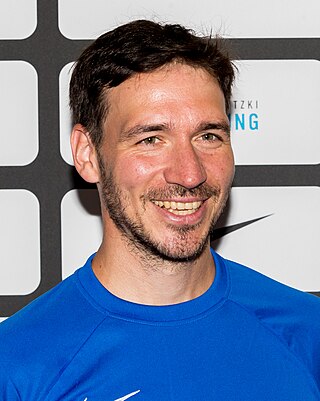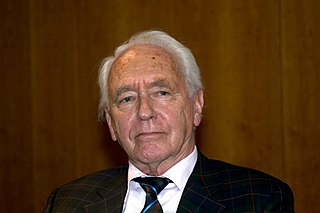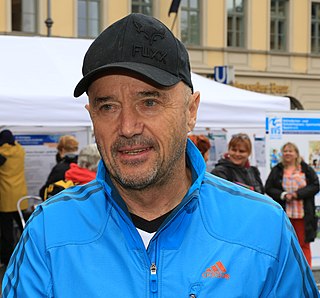
Garmisch-Partenkirchen is an Alpine ski town in Bavaria, southern Germany. It is the seat of government of the district of Garmisch-Partenkirchen, in the Oberbayern region, which borders Austria. Nearby is Germany's highest mountain, Zugspitze, at 2,962 metres (9,718 ft) above sea level.

Antje Vollmer was a German Protestant theologian, academic teacher and politician of the Alliance 90/The Greens. She became a member of the Bundestag in 1983 when the Greens first entered the West German parliament, before joining the party in 1985. From 1994 to 2005, she was Vice President of the Bundestag, the first Green in the position. She was a pacifist.

Hans Magnus Enzensberger was a German author, poet, translator, and editor. He also wrote under the pseudonyms Andreas Thalmayr, Elisabeth Ambras, Linda Quilt and Giorgio Pellizzi. Enzensberger was regarded as one of the literary founding figures of the Federal Republic of Germany and wrote more than 70 books, with works translated into 40 languages. He was one of the leading authors in Group 47, and influenced the 1968 West German student movement. He was awarded the Georg Büchner Prize and the Pour le Mérite, among many others.

Felix Neureuther is a German retired World Cup alpine ski racer and former World champion.

Petra Hammesfahr is a German crime writer. She has won several awards, including the Crime Prize of Wiesbaden and the Rhineland Literary Prize.

Wolf Dietrich Schneider was a German journalist, author, and language critic. After World War II, he learned journalism on the job with Die Neue Zeitung, a newspaper published by the US military government. He later worked as a correspondent in Washington for the Süddeutsche Zeitung, then as editor-in-chief and from 1969 manager of the publishing house of Stern. He moved to the Springer Press in 1971. From 1979 to 1995, he was the first director of a school for journalists in Hamburg, shaping generations of journalists. He wrote many publications about the German language, becoming an authority. He promoted a concise style, and opposed anglicisms and the German orthography reform.
Brigitte Irene Ahrenholz was a German rower who competed for East Germany in the 1976 Summer Olympics.

The Liebieghaus is a late 19th-century villa in Frankfurt, Germany. It contains a sculpture museum, the Liebieghaus Skulpturensammlung, which is part of the Museumsufer on the Sachsenhausen bank of the River Main. The collection comprises some 3,000 sculptures, spanning over 5,000 years of culture.

Marietta Slomka is a German journalist who has been the anchor of TV news show heute-journal since 2001.

Christian Neureuther is a former World Cup alpine ski racer from Germany.

Evi Mittermaier is a German former alpine skier who competed in the 1976 Winter Olympics and 1980 Winter Olympics. She won two World Cup races and attained 7 podiums.

Eike Christian Hirsch was a German journalist, author and television presenter. He was host of a talk show and author of a biography about Gottfried Wilhelm Leibniz. The main themes in his books were religion, humour and German language.

Saša Stanišić is a Bosnian-German writer. He was born in Višegrad, Bosnia and Herzegovina as the son of a Bosniak mother and a Serb father. In the spring of 1992, he fled alongside his family to Germany as a refugee of the Bosnian War. Stanišić spent the remainder of his youth in Heidelberg, where his teachers encouraged his passion for writing. After graduating from high school, he enrolled in the University of Heidelberg, graduating with degrees in Slavic studies and German as a second language.

Friedrich Christian Delius, also known by his pen name F.C. Delius, was a German novelist. He wrote books about historic events, such as the 1954 FIFA World Cup, and RAF terrorism. Four of his novels were translated into English, including The Pears of Ribbeck and Portrait of the Mother as a Young Woman. His awards include the Georg Büchner Prize of 2011.

Marica Bodrožić is a German writer of Croatian descent. She was born in Svib in Cista Provo, Croatia in the former Yugoslavia. She moved to Germany as a child and currently lives in Berlin.
Neureuther is a family surname.

Dörte Hansen is a German linguist, journalist and writer.

Bascha Mika is a German journalist and publicist. From 1998 to July 2009, she was editor-in-chief of Die Tageszeitung and has held the same post at Frankfurt Rundschau since April 2014. At Die Tageszeitung, Mika was the only female editor-in-chief of a national newspaper in Germany.
Gisela Elisabeth Bulla was a German archaeologist, author, and politician. She authored several books on the subject of domestic animals. From March 1995 to September 2000, she was also the federal chairwoman of the Human Environment Animal Protection Party.
Ameli Neureuther is a German fashion designer. Her creations are characterised by a mixture of historical and modern style elements as well as the interplay of fashion, illustration and art.


















